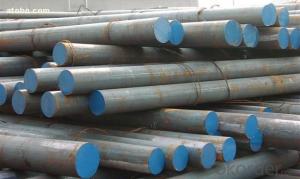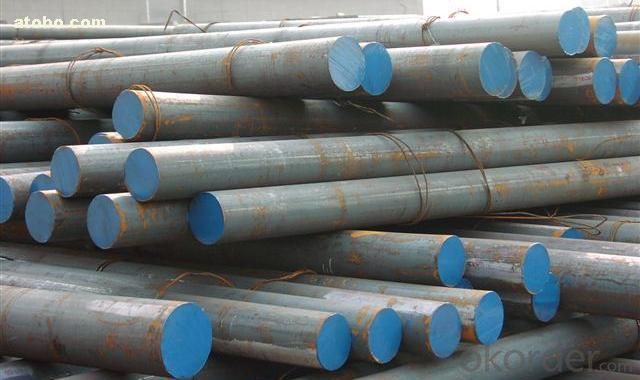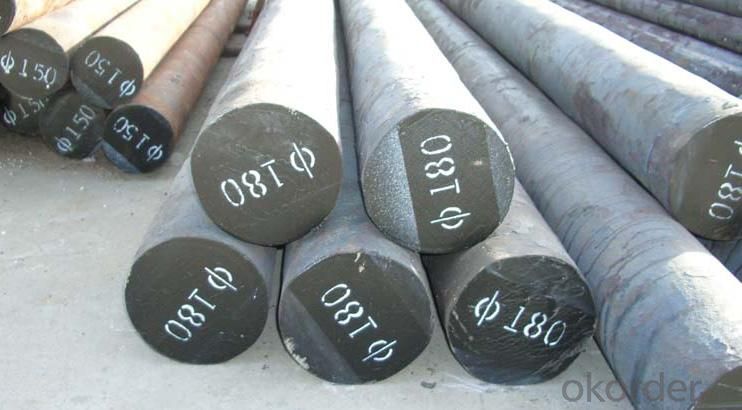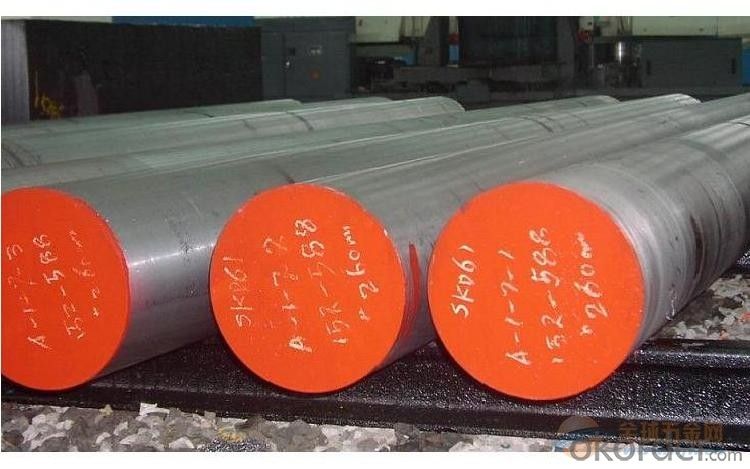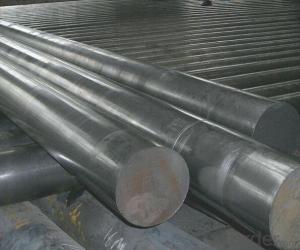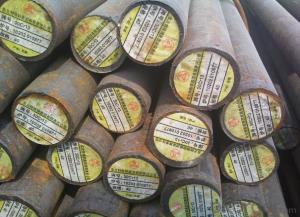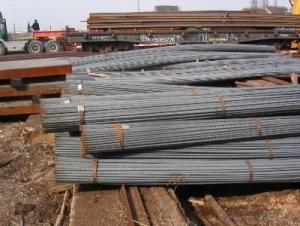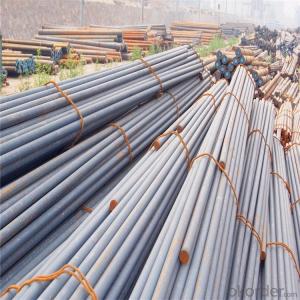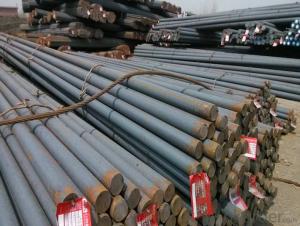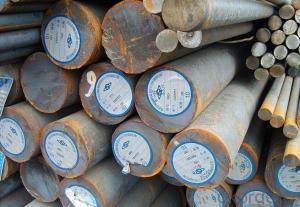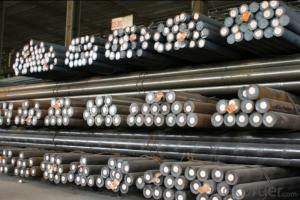SKS31 Round bar Special Steel Carbon Steel
- Loading Port:
- China main port
- Payment Terms:
- TT OR LC
- Min Order Qty:
- 25 m.t.
- Supply Capability:
- 10000 m.t./month
OKorder Service Pledge
OKorder Financial Service
You Might Also Like
Specification
Chemical Composition%(JIN)
| C | Si | Mn | Cr | Mo | P | S |
| 0.90-1.05 | ≤0.35 | 0.90-1.20 | 0.80-1.20 | 1.00-1.50 | ≤0.030 | ≤0.030 |
Available Size
| Rolled round bar | φ65-120mm × L |
| Forged round bar | φ130-290mm × L |
Heat Treatment
| Item | Temperature ℃ | Hardness |
| Anneal | 770-790 | 207-255HB |
| Quenching | 820-840 | 62-65HRC |
| Tempering | 200-280 | 55-62HRC |
Applications:
| 1.Can be used in the manufacture of cold punching, high precision punching die of cold extrusion mould and complicated shape, etc | ||||
| 2.Can be used to make small deformation, long and complicated shape of cutting tool, such as long long broach, tap, reamer, milling cutter, the gauge |


1, Your advantages?
professional products inquiry, products knowledge train (for agents), smooth goods delivery, excellent customer solution proposale
2, Test & Certificate?
SGS test is available, customer inspection before shipping is welcome, third party inspection is no problem
3, Payment Terms?
30% TT as deposit and 70% before delivery.
Irrevocable L/C at sight.
4, Trading Terms?
EXW, FOB, CIF, FFR, CNF
6, After-sale Service?
We provides the services and support you need for every step of our cooperation. We're the business partner you can trust.
For any problem, please kindly contact us at any your convenient time.
We'll reply you in our first priority within 24 hours.
- Q: Can special steel be used for making automotive engine components?
- Automotive engine components can indeed be crafted using special steel. Due to its remarkable strength, durability, and resistance to wear and corrosion, special steel is frequently employed in the manufacturing process. Engine components like crankshafts, connecting rods, camshafts, and valves necessitate materials capable of enduring high temperatures, pressures, and mechanical stresses. Special steel, encompassing high-strength alloy steel or stainless steel, fulfills these requirements and grants the essential performance characteristics for automotive engines. Furthermore, special steel presents the added advantage of reducing weight, thus contributing to improved fuel efficiency and engine performance. All in all, special steel emerges as a fitting material choice for automotive engine components, thanks to its exceptional mechanical properties and capacity to withstand the demanding conditions under which engines operate.
- Q: What are the different types of corrosion-resistant steel?
- There are several types of corrosion-resistant steel, including stainless steel, weathering steel, and galvanized steel. Stainless steel is the most common type, known for its high resistance to corrosion due to the presence of chromium. Weathering steel forms a protective rust-like layer, providing long-term corrosion resistance. Galvanized steel is coated with a layer of zinc, which acts as a barrier against corrosion.
- Q: How does special steel contribute to reducing product weight while maintaining strength?
- Special steel contributes to reducing product weight while maintaining strength through its unique properties and composition. Special steel is engineered with specific alloying elements, such as chromium, nickel, and molybdenum, that enhance its strength and durability. This allows manufacturers to use thinner and lighter steel components without compromising structural integrity or performance. Additionally, special steel can be heat-treated to further enhance its strength-to-weight ratio. By utilizing special steel, products can be designed with reduced weight, resulting in improved fuel efficiency, increased payload capacity, and overall cost savings.
- Q: How is special steel recycled or disposed of?
- The material known as special steel, or alloy steel, is highly valuable and in great demand because of its unique properties and uses. When it comes to disposing of or recycling special steel, there are several methods available depending on the condition and quality of the material. Recycling is the most preferred and commonly used method for managing special steel. The recycling process involves gathering, organizing, and melting down the steel scrap so that it can be reused in the production of new steel products. This process helps to preserve natural resources, reduce energy consumption, and minimize waste. The initial step in recycling special steel involves collecting scrap or end-of-life products that contain this material. These sources can include discarded machinery, automotive parts, construction materials, and even old appliances. Once collected, the steel is sorted and separated from other materials, such as plastic, rubber, or non-ferrous metals, using various techniques like magnetic separation, eddy current separation, or manual sorting. After the sorting process, the steel scrap is sent to a specialized recycling facility, commonly referred to as a steel mill or foundry. Here, the scrap is melted down in large furnaces at extremely high temperatures. During this process, impurities and contaminants are removed, and alloying elements can be added to achieve the desired composition and properties of the steel. Once the steel has been melted and purified, it is cast into various forms such as ingots, billets, or slabs, which can then be used to manufacture new steel products. These products may include pipes, bars, plates, or even new machine parts, depending on the specific needs of the industry. When it comes to disposal, special steel should be seen as a valuable resource and not simply discarded as waste. However, in cases where the steel is irreparably damaged or contains hazardous materials, proper disposal methods must be followed. This typically involves seeking advice from specialized waste management companies that can handle the safe and environmentally friendly disposal of such materials. In conclusion, special steel is primarily recycled due to its high value and the various benefits associated with recycling. Through the processes of collection, sorting, and melting, special steel can be transformed into new products while conserving resources and minimizing waste. Proper disposal methods are only necessary in exceptional cases where recycling is not feasible or when dealing with damaged or hazardous materials.
- Q: What are the main applications of special steel in the power generation sector?
- Special steel is widely used in the power generation sector for various applications. Some of the main applications include turbine components, such as blades and rotors, which require high strength and temperature resistance to withstand the harsh operating conditions. Special steel is also used in the construction of boilers and pressure vessels, where its corrosion resistance and high tensile strength are essential. Additionally, special steel is utilized in the manufacturing of power transmission infrastructure, such as transmission lines and transformers, to ensure efficient and reliable electricity transfer. Overall, special steel plays a crucial role in enhancing the performance and longevity of power generation equipment in the industry.
- Q: How does special steel contribute to the dimensional stability of products?
- Special steel is known for its high strength, durability, and resistance to deformation, making it an ideal material for enhancing the dimensional stability of products. By utilizing special steel in the manufacturing process, products are less likely to experience changes in shape or size due to external factors such as temperature fluctuations or mechanical stress. This improved dimensional stability ensures that the products maintain their intended form and functionality over time, leading to increased reliability and customer satisfaction.
- Q: What are the cutting tools used for machining special steel?
- The cutting tools used for machining special steel include carbide inserts, high-speed steel (HSS) tools, ceramic tools, and diamond-coated tools. These tools are designed to withstand the high temperatures and hardness of special steels, ensuring efficient and precise cutting operations.
- Q: What are the main advantages of using special steel in the automotive racing industry?
- The main advantages of using special steel in the automotive racing industry include its high strength-to-weight ratio, superior durability, and improved performance. Special steel alloys offer increased tensile strength and toughness, allowing for lighter and more rigid components, which contribute to higher speeds and improved handling. Additionally, special steel's resistance to wear and fatigue ensures better reliability and longevity of critical parts, reducing the risk of failures and costly repairs.
- Q: How does special steel contribute to the manufacturing of hydraulic components?
- Due to its unique properties and characteristics, special steel plays a vital role in the manufacturing of hydraulic components. These components, including cylinders, pumps, valves, and fittings, operate under extreme conditions and high pressure. Therefore, they require materials capable of withstanding such demanding environments. Special steel, also referred to as alloy steel, is specifically designed to possess exceptional strength, durability, and resistance to corrosion and wear. These qualities make it an ideal material for hydraulic components, as they must endure high pressures, continuous movement, and exposure to various fluids. The impressive strength of special steel allows hydraulic components to handle heavy loads and resist deformation, ensuring their long-term reliability and performance. Furthermore, the durability of special steel ensures that hydraulic components can withstand continuous stress and movement without experiencing premature failures. An additional significant advantage of special steel is its resistance to corrosion and wear. Hydraulic components often come into contact with different fluids, such as water, oil, and chemicals. The corrosion resistance of special steel protects the components from degradation and extends their lifespan. Moreover, its resistance to wear minimizes the damage caused by friction, resulting in smooth operation and reduced maintenance requirements. Furthermore, special steel is easily machinable and can be formed into complex shapes. This versatility enables the production of intricate hydraulic components with precise specifications. Manufacturers can tailor these components to meet the specific requirements of different hydraulic systems, ensuring optimal performance and efficiency. In conclusion, special steel significantly contributes to the manufacturing of hydraulic components by providing the necessary strength, durability, corrosion resistance, and wear resistance. Its unique properties enable the production of high-quality and reliable hydraulic components that can withstand demanding environments and ensure the smooth operation of hydraulic systems.
- Q: How does special steel perform in cryogenic corrosion resistance?
- Special steel has excellent performance in cryogenic corrosion resistance. It is specifically designed to withstand low temperatures and resist the corrosive effects of cryogenic substances. This type of steel exhibits minimal degradation, maintaining its structural integrity and preventing corrosion, even in extreme cold environments.
Send your message to us
SKS31 Round bar Special Steel Carbon Steel
- Loading Port:
- China main port
- Payment Terms:
- TT OR LC
- Min Order Qty:
- 25 m.t.
- Supply Capability:
- 10000 m.t./month
OKorder Service Pledge
OKorder Financial Service
Similar products
Hot products
Hot Searches
Related keywords
